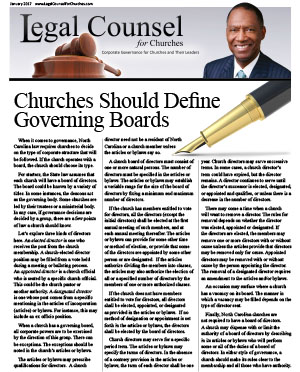Strategic planning is often thought to be an exercise reserved exclusively for corporations and for-profit businesses. Businesses engage in planning to select the right markets, products and prices for their customers. While strategic planning is essential to a business’ success, it is just as important for churches and ministries.
Strategic planning is a corporate governance matter for boards and management of church organizations. In this article, we explore why strategic planning is important to church leadership. Further, we offer steps to consider for your church and ministry.
The reason why we say strategic planning is a governance issue for churches is the result of the fiduciary duty each church leader has. The law places a fiduciary duty of care on the governance leaders of organizations. This duty compels an organization’s leaders to act in a manner that would be reasonable for other such leaders. If it seems reasonable that other organizations’ leaders should plan for the future, then it becomes reasonable that a church’s leaders would do likewise. This is because the law places the same fiduciary duties on church officers as corporate leaders.
Strategic planning can take on several forms and formats. Some organizations hold annual planning retreats for their boards and management teams to discuss the future. During these meetings, the leadership contemplates how to ensure their organization’s achievements. In some instances, organizations have these discussions at every board meeting. Time is set aside to ponder the best paths for moving forward. Regardless of the frequency, strategic planning is a fiduciary duty of a board and management.
Each board and management team are unique. As a result, the approach to strategic planning differs from one church to another. Strategic planning can be a discussion that takes place just among church leadership or with the assistance of consultants and facilitators. The important point is to ensure there is sufficient opportunity for frank and relevant discussions.
Here are some strategic church issues:
- Church leaders should discuss the economic trends in your geographic market. Is housing expanding? Are businesses growing? Is employment stable? Do these factors influence the lives of your church members?
- Churches should examine the demographic makeup of the community. Is the ethnic population changing? Are there gaps in the needs of special groups? What is the trend for the average age of local residents?
- Church leadership should monitor the membership growth trends. Is church membership growing, declining or stagnant? Where are new members coming from? What are the reasons cited why some members leave?
- Church management should regularly examine facilities and finances. Are church facilities adequate? Are major repairs, improvements or upgrades needed? Are church operating and capital reserves sufficient?
- The church board should review outreach and marketing efforts. Are church community outreach efforts effective? What reputation does the church have in the community? Does the church have a favorable brand quality for the market it pursues? Are church materials effective? Should social and digital media be used?
Strategic planning is a responsibility of church leadership. Make sure you are fulfilling your fiduciary duties.

